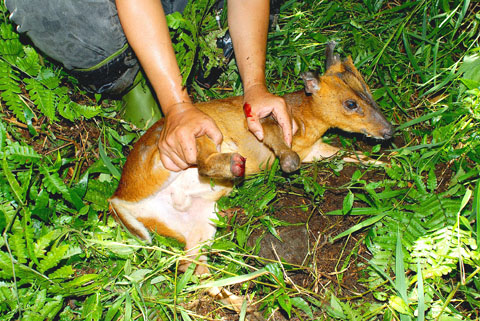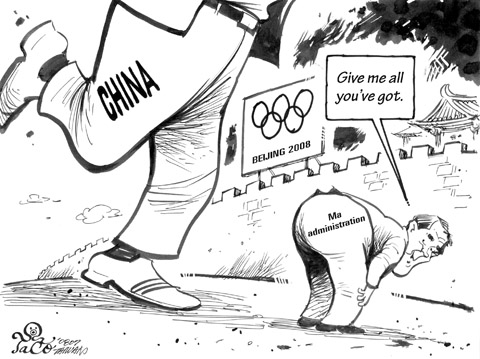Population
hits 23 million
By Lin Yi-chang AND
Lo Cheng-ming
STAFF REPORTERS, WITH CNA
Saturday, Jul 26, 2008, Page 2
While politicians often like to use the term “the will of Taiwan’s 23 million
people” in their speeches, the nation’s 23 millionth person was not born until
last Thursday.
The baby boy, identified as Wu Cheng-en (吳承恩), was born on July 17 and his birth
was registered on Wednesday at 1:50:56pm, making him the country’s 23 millionth
citizen, a statement issued by the Ministry of the Interior (MOI) said on
Thursday. The naming of the 23 millionth citizen is based on birth registrations
at the country’s 371 household registration offices, the MOI said.
The infant is his parents’ third child. Wu’s father Wu Chia-chun (吳嘉均) said he
holds high expectation for his baby son’s future.
Coincidentally, Wu and the nation’s 20 millionth person, Shen Yen-chen (沈燕禎),
who was born in 1989, are both natives of Taoyuan County’s Pingjhen City (平鎮市).
Liu Pao-min (劉保民), a household registration administrator, said that they have
been looking out for the birth of the nation’s 23 millionth person for some
time.
Nationwide household registration databases showed that Taiwan was only 425
babies away from the 23 millionth baby by the end of the day on Tuesday, Liu
said, adding that they then predicted that the 23 millionth baby would be born
on Wednesday.
The calculation was based on a birth time database provided by 371 household
registration offices across the country.
A computerized calculation was completed by monitoring the number of newborns
and subtracting the number of deaths everyday.
The MOI confirmed by the end of the day on Wednesday that Wu is the nation’s 23
millionth baby, and Minister Liao Liou-yi (廖了以) will present a certificate and a
congratulatory gold medal to the newborn in a public ceremony on a selected date
to welcome his distinction, the MOI statement said.
MOI statistics show that the nation’s population hit the 20 million mark in
April 1989. Because of the ever-declining birth rate, the population growth has
been very slow in recent years, the officials said, adding that between 1989 and
1999, the population increased by about 1 million every five years, with the
total number reaching 22 million in June 1999. The 23 millionth citizen was not
born until nine years later.
In the 1950s, each Taiwanese woman gave birth to an average of six or more
children, prompting the government to promote a policy of family planning in the
1960s and 1970s to alleviate population growth.
The trend, however, has reversed itself since 1984, when the fertility rate —
the average number of children born to each woman — fell below 2.1. The
fertility rate dropped even further to 1.1 last year, ranking Taiwan among the
countries with ultra-low birth rates.
Tunghai University social work professor Tseng Hua-yuan (曾華源) voiced concerns,
saying that the government should not only pay attention to the population
number, but also to the marriage rate and the birth rate, as they will be the
key factors in demographic changes in the future.
 |
|
Oh deer! Members of the Hualien Forest District Office remove a trap from the legs of a Formosan barking deer, an endangered species. The animal was later sent to a care center in Hualien County for treatment.
|
Scuffles break out at
last ticket venue
FINAL SALE: Chinese eager to see the Games swarmed the last ticket stall
yesterday, some stampeding a line of police in order to get one of the final
250,000 tickets
AP, BEIJING
Saturday, Jul 26, 2008, Page 5
|
|
| A cameraman from Hong Kong
Cable TV is restrained from photographing the crowd waiting to buy
tickets for the 2008 Beijing Olympics yesterday in Beijing, China.
|
Eager fans swarmed sales windows in Beijing yesterday to get
the final batch of Olympic tickets after waiting up to two days for a chance to
see next month’s games in person.
Scuffles broke out at one ticket site as officials opened additional sales
windows, causing some fans to stampede ahead of others in a bid to buy some of
the 250,000 tickets on sale, but an official said the start of the sale went
well.
“There were so many people who wanted tickets so we decided to open more ticket
windows ... In general, so far the ticket sale has gone smoothly,” Sun Weide
(孫維德) said, spokesman for Beijing’s Olympic organizing committee.
In addition to the pushing among fans, several Hong Kong media outlets
complained about being pushed around by security officials.
Footage from Hong Kong Cable TV showed a policeman putting his arm around the
neck of a Hong Kong Cable TV reporter and pulling him to the ground.
The reporter said he was assaulted after his crew refused to leave a media zone,
Cable TV reported. They were seen surrounded by dozens of police.
A spokeswoman for Hong Kong Cable TV said it was “unacceptable” for Chinese
authorities to treat the media that way.
“We hope the authorities will live up to their earlier promise to allow full
freedom of the press during the Olympic Games,” Shum Siu-wah said.
Zhang Xiaojing, 17, who came from Changzhou in Hebei Province to buy tickets,
said the line was pretty orderly when she arrived on Thursday afternoon, but
there was an uncontrolled rush early yesterday when the additional sales windows
opened.
“People started to stampede in,” she said.
But for others like Xue Manjie, the wait was worth it. The 19-year-old and eight
friends bought tickets after waiting since Thursday morning.
“We can’t get the tickets for the games we want but at least we can have a look
inside the Water Cube and the Bird’s Nest,” Xue said, referring to the swimming
venue and the main athletics stadium, while flashing his tickets.
Xue and his friends, who just finished their university entrance exams, wanted
tickets to the basketball, but had to settle for synchronized swimming and
preliminary track and field events.
At Wukesong in the western part of Beijing, tens of thousands of people were
lined up to buy tickets for the popular basketball competition. About 20,000
basketball tickets were expected to go on sale.
Besides the Olympics tickets for events in Beijing, another 570,000 tickets are
on sale for soccer matches in co-host cities: Tianjin, Shanghai, Shenyang and
Qinhuangdao.
All told 6.8 million Olympic tickets have been available for domestic and
foreign sales. The Olympics start on Aug. 8.
Organizers were embarrassed last November when the computer system crashed,
forcing organizers to sack the Olympic ticketing chief and revert to a lottery
system to sell tickets.

If only
Paul Wolfowitz is right
Saturday, Jul 26, 2008, Page 8
It was strange to see a once-powerful person like former US deputy secretary of
defense and World Bank president Paul Wolfowitz addressing more benign issues of
trade in a speech to the American Chamber of Commerce in Taipei this week. The
neocon, or hawk, or whatever label the reader prefers, who played such a big
role in shaping the US’ aggressive policy in the Middle East spent much of the
time talking about Taiwan, Taiwanese people and their democratic “experiment” in
glowing, almost emotive terms.
Wolfowitz called himself a friend of Taiwan, and there is no reason to doubt
this given his involvement in defense issues affecting Taiwan in the last 25
years or so. And it is a bipartisan friendship as far as Taiwanese politics is
concerned: Wolfowitz had no interest in presenting commentary on domestic
squabbles.
But he did raise the 1984 murder of writer Henry Liu (江南) on US soil by Taiwan’s
security services, and observed that with this killing the goodwill that the
Chiang dynasty had generated in Washington over the decades was close to
dissipating, threatening to turn Congress against the Chinese Nationalist Party
(KMT) regime.
This was a welcome reminder that what Taiwan is now is very different to what it
was then. But Wolfowitz’s words also had the flavor of a warning: Taiwan’s
security, now as then, hinges on the regard in which Taiwan — or more precisely,
its government — is held by Congress and the US administration, and that this
affection had been tested in recent years by the Democratic Progressive Party
government.
That affection is still there, though a combination of US wars in the Middle
East and the pro-China machinations of members of the State Department and their
academic networks, not to mention the China lobby, tends to stifle this
affection.
That may all be changing, judging from Wolfowitz’s confidence (amid
none-too-subtle prodding) that the arms freeze conceded by US Admiral Timothy
Keating will be lifted, possibly before the end of the congressional session in
September, and hence before the next US president takes office.
Amid gloomy forecasts by local defense analysts, there are increasing reports of
activity in and around Congress to deliver the arms that the government agreed
to so long ago. And yesterday’s comments by Jason Yuan (袁健生), Taiwan’s new envoy
to Washington, that the delivery of the arms is “almost a done deal,” suggest
that senior KMT figures know more about maneuvering in Washington than it cares
to admit — right down to the visit to Taiwan of a top US figure in the weeks to
come.
This is all well and good. If we can assume that Yuan’s comments are a
reflection of the reality and not just bluster from an envoy who seems not to
know when to close his mouth, then there is hope on the horizon that Taiwan will
be able to lurch back in the direction of keeping the Chinese military threat
within its capabilities.
But if US President George W. Bush does not live up to Wolfowitz’s expectations
and does not release the arms, then these things will become crystal clear: the
pro-China group in the State Department will have triumphed, Taiwan’s new envoy
will have been discredited even before arriving in the US and Taiwan’s security
will be at the mercy of the US electoral process, giving China even more time to
tighten the screws.